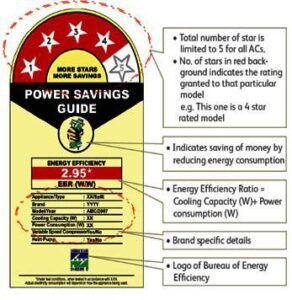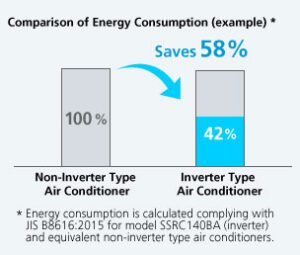How to select the Right Air Conditioner (AC)
Choosing the right air conditioner for your home can be a daunting task, but there are a few key factors to consider that can make the process easier:
Determine the size you need
- The size of your air conditioner is critical to its performance and efficiency
- A unit that is too small will struggle to cool your home, while a unit that is too large will cycle on and off frequently, wasting energy and money.
- Consider the square footage of the space you need to cool, as well as the ceiling height, insulation, and number of windows.
Area Calculation
- In this method calculate the total floor area of the room where the AC to be installed
- Take a square root of area (√A) and divide by 10 to get an approximate tonnage of AC.
- If this ratio is 1.5 means you need 1.5 tonnage AC
- For example: Consider a room that is 20 feet wide and 10 feet long.
- Area= 20 x 15 = 300
- Raio= √ A/10 =17.3/10 = 1.7
- Conclusion: for a 300 sq. ft. room, you may need an approximate a tonnage of 1.7 of AC
Volume Calculation
- In this method determine the volume of room y( Volume = length x breadth x height, ft3)
- Divide the volume of the room (V) by 1000. The resultant ratio is the required tonnage capacity of AC.
- For example: Consider a room that is 15 feet long, 10 feet wide with a height of 20 feet.
- The volume of room (V)=length breadth x d height = 15 x 10x 20 = 3000 ft2
- Ratio = V/1000 = 3
- Conclusion: for the 3000 cubic feet, where the height is double the length (2L), you can buy t a 3-ton AC.
Look for Energy efficiency:
- Air conditioners are rated by their SEER (Seasonal Energy Efficiency Ratio) and EER (Energy Efficiency Ratio)
- The higher the SEER or EER, the more efficient the unit. Look for an AC unit with a SEER rating of 14 or higher.

Consider the type of AC Unit
- There are several types of air conditioners, including window units, split systems, and portable units. Window units are typically the most affordable and easy to install, while split systems are more efficient and quiet but require professional installation. Portable units are a good option if you need to cool different rooms at different times.
Features:
- Consider the features you want in your air conditioner, such as a remote control, adjustable thermostat, and programmable settings. Some models also offer air purifying and dehumidifying functions.
Brand and Warranty:
- Look for reputable brands with good customer reviews and warranties. A good warranty will provide peace of mind in case of any issues with your unit.
Overall, it’s important to consider your budget, the size of your space, and your specific needs when selecting an air conditioner for your home. It’s also a good idea to consult with a professional HVAC technician who can help you make an informed decision based on your unique circumstances.

What is the energy efficiency of an Air Conditioner
- The energy efficiency of an air conditioning (AC) system can be measured using a metric called Seasonal Energy Efficiency Ratio (SEER).
- SEER measures the cooling output of an AC system over a typical cooling season, divided by the energy it consumes in watt-hours
- if the higher is the SEER rating, then the system is more energy-efficient.
- In general, the energy efficiency of an AC system depends on several factors, including the size of the unit, the type of compressor used, the type of refrigerant used, and the overall design of the system.

- Newer AC systems are generally more energy-efficient than older ones, thanks to advancements in technology and more stringent energy efficiency regulations
- According to the U.S. Department of Energy, a SEER rating of 14 or higher is considered energy-efficient for residential AC systems.
- However, some high-end models can have SEER ratings of 20 or higher, which means they are extremely energy-efficient. Choosing an AC system with a high SEER rating can help reduce energy consumption and save you money on your energy bills.

Types of AC
- In the previous post, you can learn working principles and types of AC
- Air conditioning has become an integral part of modern life, providing us with cool and comfortable environments even during the hottest months of the year.
- With so many different types of air conditioning units available, it can be challenging to choose the right one for your needs. In this blog post, we’ll take a look at some of the most common types of AC units and their features.

Window Air Conditioners:
- Window air conditioners are one of the most popular types of AC units.
- These units are designed to be installed in a window or a hole in a wall.
- They are usually suitable for small rooms and provide efficient cooling without taking up too much space. Window AC units are also very affordable compared to other types of AC units.
Split Air Conditioners:
- Split air conditioners consist of two separate units, an indoor unit, and an outdoor unit.
- The indoor unit is usually mounted on a wall inside the room, while the outdoor unit is installed outside the building.
- Split AC units are more expensive than window AC units, but they are generally more energy-efficient and offer better cooling performance.
- They are also quieter than window units as the compressor is installed outside.
Portable Air Conditioners:
- Portable air conditioners are freestanding units that can be moved from room to room as needed
- They are relatively easy to install, and they don’t require any permanent installation.
- Portable AC units are usually suitable for smaller rooms and are an excellent option if you are renting a house or apartment where you cannot make any permanent modifications to the structure.
Central Air Conditioners:
- Central air conditioners are designed to cool an entire building or a large house
- These units are usually installed outside the building, and they use ducts to distribute cool air throughout the house. Central air conditioners are very effective at cooling large spaces, but they are also the most expensive and require professional installation.
Ductless Mini-Split Air Conditioners
- Ductless mini-split air conditioners are similar to split AC units, but they don’t require any ductwork to distribute cool air. They consist of an outdoor unit and one or more indoor units that are mounted on the wall inside the room. Ductless mini-split AC units are energy-efficient and offer better cooling performance than window units. They are also relatively easy to install and are suitable for larger rooms.
- There are many different types of air conditioning units available, each with its own set of features and benefits. When choosing an AC unit, it’s essential to consider factors such as the size of the room, the level of cooling required, and your budget
- By understanding the different types of AC units, you can choose the one that best meets your needs and provides you with a comfortable living space.
Difference between wall AC and window AC
Wall AC and window AC are two types of air conditioning units that are commonly used to cool indoor spaces. Here are some key differences between the two:
- Installation: A window AC unit is designed to fit into a window frame, whereas a wall AC unit is installed directly into a wall. Installing a wall AC unit requires cutting a hole in the wall and mounting the unit. Window AC units are generally easier to install.
- Size: Wall AC units are generally larger and more powerful than window AC units. This is because they are designed to cool larger spaces and are installed permanently. Window AC units are typically designed for smaller spaces and are more portable.
- Energy efficiency: Wall AC units are generally more energy-efficient than window AC units because they are designed to be permanently installed and have a better seal. Window AC units can allow air to leak in and out around the unit, reducing their efficiency.
- Cost: Wall AC units are generally more expensive than window AC units. This is because they are larger and more powerful and require more complex installation.
- Noise: Wall AC units tend to be quieter than window AC units, as they are designed to be permanently installed and have better sound insulation.
Overall, the choice between a wall AC and a window AC depends on the size of the space you need to cool, your budget, and your installation preferences.

